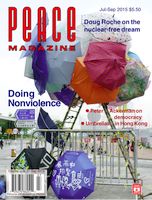
Peace Magazine Jul-Sep 2015, page 5. Some rights reserved.
Search for other articles by peacemag here
Some anonymous person, perhaps tongue-in-cheek, has offered to explain the violence and mess in one part of our world. It is as follows:
“We support the Iraqi government in the fight against ISIS. We don’t like ISIS, but ISIS is supported by Saudi Arabia who we do like. We don’t like Assad in Syria. We support the fight against him, but ISIS is also fighting against him. We don’t like Iran,but Iran supports the Iraqi government in its fight against ISIS.
“So some of our friends support our enemies, some enemies are now our friends, and some of our enemies are now fighting against our other enemies who we want to lose, but we don’t want our enemies who are fighting our enemies to win. If the people who we want to defeat are defeated, they could be replaced by people we like even less. All this was started by us invading a country to drive out terrorists who were not actually there, until we went in to drive them out—it’s quite simple.”
Canada has become a global arms dealer. In 2014, Canada sold military equipment to Saudi Arabia valued at 14 billion dollars. Some of these light tanks were seen rolling through the streets of Bahrain, helping contain pro-democracy protests.
The power of Canada’s arms industry is enormous, reaching a total of $18 billion annually. This industry involves 2,000 security and defence firms. Half of our military export sales go to the US—no export approval required.
Is the Harper government trying to assure Canadians that our security will be enhanced through military means, rather than restoring Canada’s reputation as a nation of peacekeepers?
Leo Kurtenbach, Saskatoon
The New York Times recently ran an alarming and bizarre story about Pentagon plans for more war in the Middle East. President Obama is said to be considering a plan to send hundreds of additional American troops to Iraq, on top of the 3500 troops he has already committed. The plan also calls for creating a network of new US military bases to support the Baghdad government in fighting the Islamic State.
General Martin Dempsey, Chair of the Joint Chiefs of Staff, is the principal advocate for the new military bases in Iraq. Here is the bizarre part: he is describing the proposed new bases as “lily pads.”
Think about the absurdity of that. Lily pads in the desert!
Instead of “lily pads,” let’s create oases. Places of healing to promote reconciliation. Oases of fresh thinking for constructive alternatives.
US military intervention is the problem in Iraq, not the solution. The United States has been using military force in the Middle East for more than a decade and the result has been more terrorism, greater instability, and the spread of violence and war. Since the US started bombing Syria and Iraq last year, extremist forces in the region have grown stronger.
Overcoming the threat of the so-called Islamic State requires diplomatic and political strategies, not US military intervention. Rather than sending more troops our government should be focusing on ending the war in Syria and achieving inclusive governance in Iraq. In Syria this means a renewed diplomatic push to end the civil war and achieve a negotiated political settlement. In Iraq it means forging power-sharing arrangements that can address the grievances of Sunni Arab communities.
The spreading blood-shed in the Middle East is a global problem, and it requires global solutions. The United States should take this crisis to the United Nations and lead a vigorous large scale response that is commensurate with the magnitude of the threat.
I outlined some of the alternative strategies in my presentation to the Sojourners Summit for Change in June in Washington.
If the United States were to devote as much effort to political and diplomatic approaches as it does to military measures, the chances for success would increase. If our government were to send to the region thousands of diplomats, trained peacebuilders and aid workers rather than deploying more troops and building “lily pad” bases, perhaps we could begin to create those oases of sanity that are needed to counter the ravages of war. Let’s send a clear message to the White House and Congress:
No more troops or military bases in Iraq. Focus on diplomatic and political solutions, and support a greater role for the UN.
David Cortright, Kroc Institute, Notre Dame University

Peace Magazine Jul-Sep 2015, page 5. Some rights reserved.
Search for other articles by peacemag here